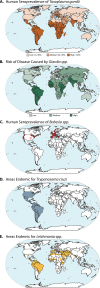Transmission and epidemiology of zoonotic protozoal diseases of companion animals
- PMID: 23297259
- PMCID: PMC3553666
- DOI: 10.1128/CMR.00067-12
Transmission and epidemiology of zoonotic protozoal diseases of companion animals
Abstract
Over 77 million dogs and 93 million cats share our households in the United States. Multiple studies have demonstrated the importance of pets in their owners' physical and mental health. Given the large number of companion animals in the United States and the proximity and bond of these animals with their owners, understanding and preventing the diseases that these companions bring with them are of paramount importance. Zoonotic protozoal parasites, including toxoplasmosis, Chagas' disease, babesiosis, giardiasis, and leishmaniasis, can cause insidious infections, with asymptomatic animals being capable of transmitting disease. Giardia and Toxoplasma gondii, endemic to the United States, have high prevalences in companion animals. Leishmania and Trypanosoma cruzi are found regionally within the United States. These diseases have lower prevalences but are significant sources of human disease globally and are expanding their companion animal distribution. Thankfully, healthy individuals in the United States are protected by intact immune systems and bolstered by good nutrition, sanitation, and hygiene. Immunocompromised individuals, including the growing number of obese and/or diabetic people, are at a much higher risk of developing zoonoses. Awareness of these often neglected diseases in all health communities is important for protecting pets and owners. To provide this awareness, this review is focused on zoonotic protozoal mechanisms of virulence, epidemiology, and the transmission of pathogens of consequence to pet owners in the United States.
Figures













References
-
- APPA 2012. APPA national pet owners survey 2011-2012. APPA, Washington, DC: http://www.americanpetproducts.org/press_industrytrends.asp
-
- Krause-Parello CA. 2012. Pet ownership and older women: the relationships among loneliness, pet attachment support, human social support, and depressed mood. Geriatr. Nurs. 33:194–203 - PubMed
-
- McConnell AR, Brown CM, Shoda TM, Stayton LE, Martin CE. 2011. Friends with benefits: on the positive consequences of pet ownership. J. Pers. Soc. Psychol. 101:1239–1252 - PubMed
-
- Larsen BA, Lingaas F. 1997. Dogs and health. A review of documented connections. Tidsskr. Nor. Laegeforen. 117:4375–4379 (In Norwegian.) - PubMed
-
- Raina P, Waltner-Toews D, Bonnett B, Woodward C, Abernathy T. 1999. Influence of companion animals on the physical and psychological health of older people: an analysis of a one-year longitudinal study. J. Am. Geriatr. Soc. 47:323–329 - PubMed
Publication types
MeSH terms
Grants and funding
LinkOut - more resources
Full Text Sources
Other Literature Sources
Medical
Miscellaneous

